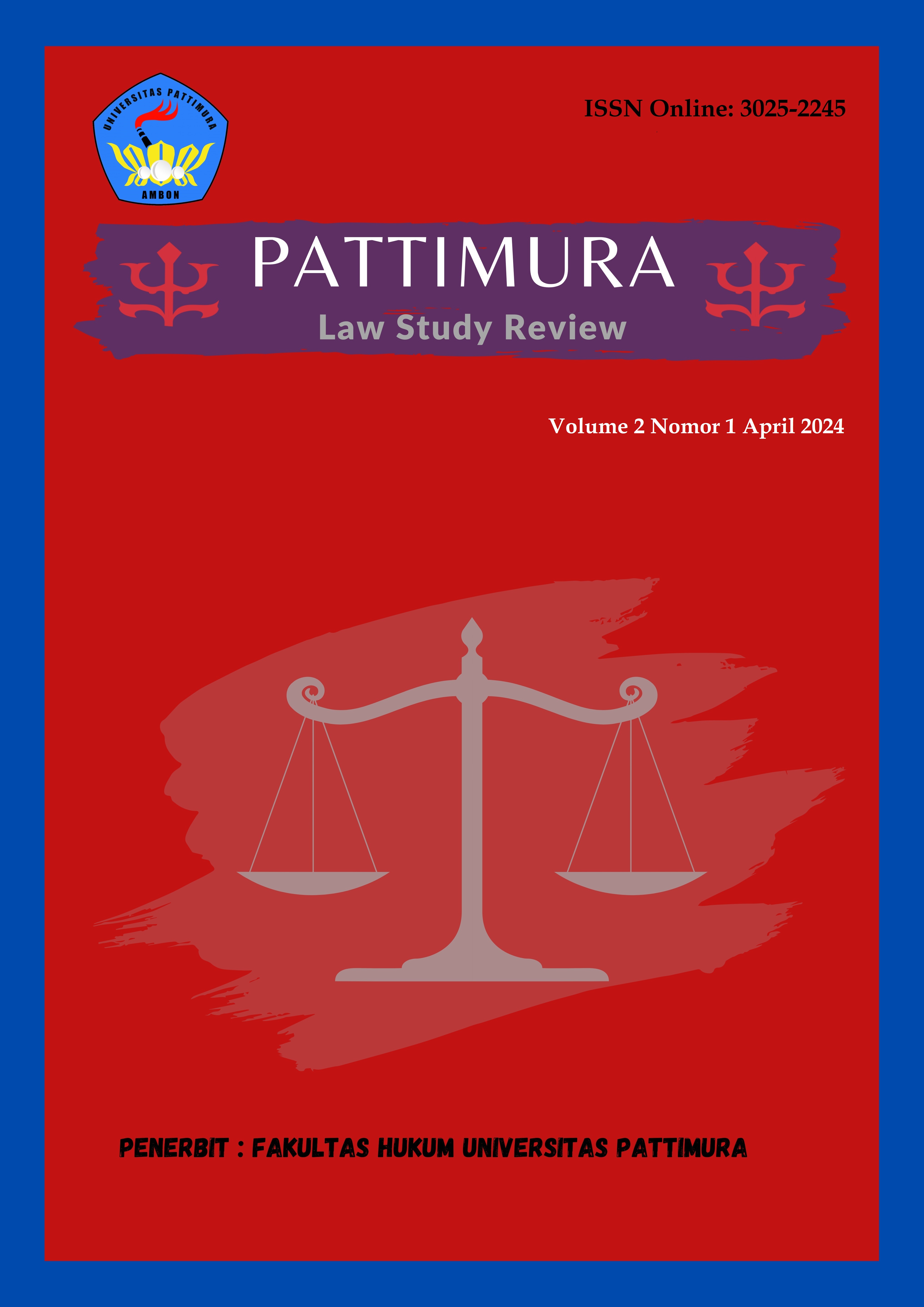Kebijakan Hukum Pidana Terhadap Tindak Pidana Kepemilikan Senjata Api Oleh Masyarakat Sipil
Abstract
ABSTRACT: Possession and misuse of firearms by civilians is a very dangerous and potentially dangerous matter. How firearms can cause the death of a person or many people. Even though firearms are very important for national defense and security, firearms can usually cause very detrimental consequences for individuals and society if they are misused or used not in accordance with applicable regulations. Therefore, this paper aims to determine the legal policies implemented regarding the ownership of firearms by civilians. The research method used in this writing is Normative Juridical, the problem approach used is the statutory approach, case approach and conceptual approach, the legal materials used are primary legal materials, secondary legal materials and tertiary legal materials. The procedure for collecting legal materials in this writing was carried out using the literature study method, the processing of legal materials in this writing was carried out by systematizing the legal materials by carrying out selection of legal materials and the analysis used in this writing used qualitative analysis methods. The result of the discussion of this writing is to explain one form of criminal law policy, namely Formulation Policy. Formulation Policy is a step taken by the state to formulate any actions that are considered disgraceful, then use criminal law as an effort to overcome actions that are considered disgraceful, so that people stay away from them or do not commit these actions. However, in reality, the current criminal law formulation policy, especially regarding the current Policy for Formulating the Crime of Illegal Firearms Possession, has a number of fundamental weaknesses, thus affecting the level of effectiveness in the implementation of eradicating the crime of Illegal Firearms Possession, due to weaknesses in the formulation stage (in abstracto) is a strategic weakness for the next stage, namely the application and execution stage (in concrete). Apart from that, there are many law enforcement efforts carried out related to criminal acts of possession of firearms by civil society, including: preventive efforts and repressive efforts. In efforts to enforce the law, the obstacles encountered are: internal obstacles and external obstacles.
Downloads
References
Andre Arvendo, Penegakan Hu kum Terhadap Pelaku Tindak Pidana Tanpa Hak Menyimpan Dan Mempergunakan Senjata Api Rakitan Secara Ilegal, Jurnal Kewarganegaraan Vol. 6 No. 4 Desember 2022.
Bagoes Rendy Syahputra, Pertanggungjawaban Pidana atas Kepemilikan Senjata Api Tanpa ijin Berdasarkan Peraturan Perundang-undangan di Indonesia, Juris-Diction: Vol.2 No.6,November 2019.
Bagoes Rendy Syahputra, “Pertanggungjawaban Pidana Atas Kepemilikan Senjata Api Tanpa Ijin Berdasarkan Peraturan Perundang-Undangan Di Indonesia,” Jurist-Diction 2, no. 6 (2019): 2007–24, https://doi.org/10.20473/jd.v2i6.15940
Denny Latumaerissa, “Tinjauan yuridis tentang penerapan ancaman pidana mati dan tindak pidana korupsi”, Jurnal Sasi, vol 20 no 1 bulan januari-juni 2014, hal 11.
Evan Munandar, Penanggulangan Tindak Pidana Kepemilikan dan Penggunaan Senjata Api Tanpa Izin Dalam Sistem Peradilan Pidana, Syiah Kuala Law Journal: Vol. 2(3) Desember 2018.
Harja Wijaya,Tinjauan Yuridis Terhadap Pelaku Tindak Pidana Kepemilikan Senjata Tajam, Qawanin Jurnal Ilmu Hukum Vol. 1, No. 1.
Jasmin Michael Gultom, “Efektivitas Police To Police Cooperation Kepolisian Republik Indonesia Dengan Kepolisian Filipina Dalam Memberantas Tindak Kejahatan Penyelundupan Senjata Api Ilegal,” Journal of International Relations 4, no. 3 (2018): 472–78.
Kansa Ahsani Maf’ula, Penyalahgunaan Senjata Api Pelaku Militer dan Pelaku Sipil, Jurist-Diction Vol. 3 (1) 2020.
Margie Gladies Sopacua, Penegakan Hukum Pidana Terhadap Kegiataan Pertambangan Tanpa Izin, Vol 1, No 12 (2022): Volume 1 Nomor 12, Februari 2022
Buku
Adrianus Meliala, Senjata Api dan Penanaganan Tindak Krimmal, Yayasan Pustaka Obor Indonesia, Jakarta, 2015.
Aloysius Wisnubroto, Kebijakan Hukum Pidana dalam Penanggulangan Penyalahgunaan Komputer, Yogyakarta, Universitas Atmajaya, 1999.
Barda Nawawi Arief, Kapita Selekta Hukum Pidana (Bandung: Citra Aditya Bakti, 2010).
Barda Nawawi Arief, Kebijakan Legislatif Dalam Penanggulangan Kejahatan Dengan Pidana Penjara, (Yogyakarta: Genta Publishing, 2010).
Lilik Mulyadi, Bunga Rapai Hukum Pidana Perspektif Teoritis dan Praktik, PT. Alumni Bandung, 2008.
Matthew B. Milles dan Michel Huberman, Analisis Data Kualitatif, Jakarta, 1992.
Sudarto, Hukum dan Hukum Pidana, Bandung, Alumni, 1981.
Satjipto raharjo,(2000), Ilmu Hukum, Bandung; Citra aditya bakti.
Satjipto Raharjo, (2007), hukum dan masyarakat, Bandung: Angkasa.
Soerjono Soekanto, Faktor-Faktor Yang Mempengaruhi Penegakan Hukum (Jakarta: Raja Grafindo Persada, 2016).
Tresna, Asas-Asas Hukum Pidana Disertai Beberapa Perbuatan Pidana Yang Penting, Tiara, Jakarta, 2007.
Wirjono Prodjodikoro, Asas-Asas Hukum Pidana di Indonesia, Refika Aditama, Bandung, 2008.
Lain-Lain
Http://erabaru.net/nasional/50-jakarta/16724-polri-tarik-senjata-api-sipil.
Rasmita Juliana Sitepu, Kajian Kriminologi terhadap Penanggulangan Kejahatan dengan Senjata Api, di unduh dari www.repository.usu.ac.id, tanggal 10 april 2023.
Wawancara dengan Ipda. Andre Soplanit, penyidik Reskrimsus Mapolda Maluku, pada hari jumat, 3 november 2023.
Copyright (c) 2024 Marlen Termature, Margie Gladis Sopacua, Denny Latumaerissa (Author)

This work is licensed under a Creative Commons Attribution-NonCommercial 4.0 International License.
Authors who publish their manuscripts in this Journal agree to the following conditions:
- The copyright in each article belongs to the author, as well as the right to patent.
- Authors are able to enter into separate, additional contractual arrangements for the non-exclusive distribution of the journal's published version of the work (e.g., post it to an institutional repository or publish it in a book), with an acknowledgment of its initial publication in this journal.
- Authors are permitted and encouraged to post their work online (e.g., in institutional repositories or on their website) prior to and during the submission process, as it can lead to productive exchanges, as well as earlier and greater citation of published work.
- Authors have the right to self-archiving of the article (Author Self-Archiving Policy)













